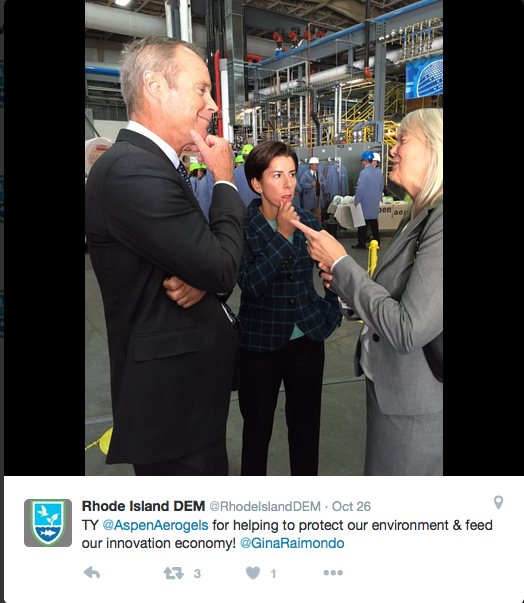Environmental Management or PR Department? It’s Hard to Tell
November 8, 2015

The recent tweet was and is poppycock, especially from a government agency whose job is to protect the environment. It reads more like a chamber of commerce posting: “TY @AspenAerogels for helping to protect our environment & feed our innovation economy!”
The company being praised by the Rhode Island Department of Environmental Management (DEM) for its environmental protections is an East Providence business that has spilled some 4,700 gallons of ethanol in the past two years, been fined by DEM for air pollution violations and is well paid by the fossil-fuel industry.
This isn’t meant to slam Aspen Aerogels, criticize its environmental record or question its business practices. DEM has marketed the company, falsely, as some sort of environmental protector. It doesn’t deserve that moniker. Are we now going to brand “environmental protector” in the same manner as “green,” “natural” and “local”?
Like nearly all companies, Aspen Aerogels isn’t “helping to protect our environment.” Businesses can be environmentally responsible, and many are, but very few actually protect the environment. Capitalism doesn’t protect natural resources; it’s built to do just the opposite. To help balance that fact, government agencies were created to protect, monitor and manage those resources. In Rhode Island, apparently, the agency created to do just that also is responsible for pumping up the state’s business climate.
Even in this age of climate-change concerns and dwindling resources, it’s already difficult to have substantial discussions about real environmental protections. That conversation is even more challenging when the state agency responsible for environmental management doesn’t respect the concept. Look no further than its ridiculous tweet from Oct. 26.
Touting a business that uses materials mined from the earth and whose products are used by “19 of the world’s top 20 petrochemical companies” — a list that includes the likes of ExxonMobil, Dow Chemical and DuPont — for its help in protecting the environment is both disingenuous and disconcerting.
DEM celebrating the environmental stewardship of a company that took 2.5 hours to report the spill of 4,500 gallons of ethanol to the East Providence Fire Department and a business the agency itself fined for failing to capture volatile organic compounds and ammonia emissions and fined another time for violating the Clean Air Act is absurd. It also sends a conflicting message.
When did the state agency entrusted with “preserving the quality of Rhode Island’s environment, maintaining the health and safety of its residents, and protecting the natural systems upon which life depends” become the taxpayer-funded public-relations arm for Ocean State businesses?
A quick look at the DEM Twitter feed reads more like that of a chamber of commerce than an environmental management agency. The feed is filled with thank-you’s to businesses and has 20 tweets dedicated to the recent announcement that the Volvo Ocean Race 2018 will be held in Newport — a great event worthy of celebrating, but couldn’t all the economic gushing have been left to the Rhode Island Commerce Corporation?
While DEM’s role shouldn’t be about the destruction of Rhode Island’s business environment, it also shouldn’t be one of economic development cheerleader. Environmental management doesn’t mean applauding businesses and corporations for using the Ocean State’s natural resources.
Frank Carini is the editor of ecoRI News.
Categories
Join the Discussion
View CommentsRecent Comments
Leave a Reply
Your support keeps our reporters on the environmental beat.
Reader support is at the core of our nonprofit news model. Together, we can keep the environment in the headlines.
We use cookies to improve your experience and deliver personalized content. View Cookie Settings




Thanks Frank. DEM, under orders from the politicians and their paymasters, has fallen prey to the business climate mentality and the need to be business friendly, despite the fact that the business climate has almost nothing to do with how well an economy works. Other factors are MUCH more important. The job of DEM needs to be to restore ecosystem functioning, and they are not really doing that. All they seem to do is try to slow down the attack a bit, but death by 1000 cuts is still ecosystem death. This is especially unfortunate as in the age of climate change, economic stagnation (worth a much longer essay) and ecosystem collapse, the repairing of our ecosystems is what is going to keep Rhode Island fed.
RI DEM, like RI DOT, like RI judges, etc. are "political appointees" (insiders) not professionals who are held accountable for their failures by those who appoint them. While it seems obvious to most of us who have seen RI’s unimpeded destruction of our wetlands by developers with DEM’s "No Permits, No Problem" policy, it is not so obvious to the general public. Why? In my opinion, political appointees are never held accountable for their epic failures because "mainstream media" sells entertainment, not investigation the truth of RI’s rampant pollution. Therefore most of RI’s public remains "unaware" of how RI’s "incestous political system" is slowly destroying our environment. That’s the bad news, the good news is most younger people ignore mainstream news, and now get their information online from real "investigative reporters" like Frank Carini. More and more people are "aware" that DEM is just a "front" for developers. "Awareness is always the first step." Thanks Frank for making us "aware".
Great article. The DEM is also stocking hatchery trout over native brook trout on the upper Wood River, harming the brook trout, which are already listed as a species in greatest need of conservation by the DEM. The reason for this is because the DEM believes stocking trout generates license sales. As a result, the agency is putting a rare, native species at risk in order to chase a few dollars. This doesn’t sound like "preserving the quality of Rhode Island’s environment" or "protecting the natural systems upon which life depends" to me. To learn more about this issue visit the Protect Rhode Island Brook Trout website and Facebook Page.
Did you even spend tow minutes looking what Aspen actually does? Its insulating aerogel blankets are one of the most efficienct insulators available, and are effective at reducing energy and fossil fuel use at the petrochemical, oil refiners, and other dirty companies which are Aspen’s main customers. Aspen’s business is making very dirty companies somewhat less dirty. While ethanol spills are never a good thing, if Aspen Aerogels did not exist as a company, the world would be a dirtier place overall.
Tom, I know what the business does, and the piece isn’t a criticism of it, its products or employees. The piece is about the role of a state agency and how it appears to have lost its way. — Frank Carini/ecoRI News editor
You make some valid points about the overall orientation of DEM these days. The question is, how much of its public orientation these days is dictated by the Governor and the General Assembly? Could DEM’s leadership be doing a better job of ‘threading the needle’? In other words, could it do a better job keeping its enemies and detractors in the political class at bay while simultaneously making real progress on core issues of environmental protection, management and restoration. The strategy seems to have been for a while to emphasize those components of DEM that manage and promote parks and recreation, agriculture, and fisheries responsibilities, and downplay difficult and controversial issues of advancing ambitious environmental mandes.. Arguably, one result has been toothless enforcement of environmental laws and regulations; another is growing public discontent with DEM’s leadership.
On the other hand, DEM leadership cannot take risks if they don’t feel there is adequate public and advocacy support for it doing so. ECRI and other similarly oriented groups need to become better advocates for the environmental protection mandes DEM is obliged to uphold and advance on the behalf of all Rhode Islanders.
What’s next?–DEM praising the "ongoing clean-up efforts" which the metals recycling operation on Allens Avenue has been doing for years?
Whether or not this company or DEM is guilty of greenwashing, I’d suggest that I’ve recently read some pretty fluffy articles in this here publication in recent months. The one about that new hydroponic greenhouse lettuce factory springs to mind… Any analysis of the environmental impact there? I read nothing in that article about the various environmental downsides to hydroponics, for example.
RI DEM main priority should be protecting RI’s air and drinking water, the are EPA’s agent for enforcing the Clean Air and Clean Water Acts. If RI DEM says it doesn’t have the resources to do so, then ask yourself who is protecting the air you breathe, and the water you drink? It is obvious that DEM is policy is to be "business friendly" when it allows heavy industries to operate for years over our RI’s aquifers with its "No Permits, No Problem" policy for major polluters.
Wow, another old-fashioned attack. Let’s make sure that environmental protection and doing business in RI don’t mingle. That we don’t cozy up to businesses, because that is, of course, the sole responsibility of our economic development gurus. That we don’t let down our guard, but preserve the gospel of us vs them. As environmentalists, after all, we cannot trust any business. For good measure, let’s throw in something about capitalism being fundamentally at odds with environmental protection. Mobilize the masses! The fight continues (and we are the holy warriors)!
I don’t know enough about this particular company, and you may well have a legitimate concern about its particular environmental record, and about a comment from the State’s CEO that might seem unaware of that record. Or has the company actually made a conscious effort to improve its practices? Some do. Many more than you may think, or are willing to acknowledge, do. Regardless, using one example to generalize as you do is not defensible. The claim about capitalism is similarly so broad as to become laughable; witness the many businesses that "do good by doing well." That’s not to say that capitalism is the solution for everything, or that it does not ever degenerate into plundering our common resources, but again, a little more nuance would go a much longer distance, and alienate a lot fewer people unnecessarily. Finally, attacking DEM and trying to bolster your case by mis-characterizing is Twitter feed as if it reads like a Chamber of Commerce PR job is below, I submit, the standard that ecoRI has generally set for environmental reporting. It’s simply not true
Just like the recent article on enforcement, with its outdated insistence on measuring environmental progress primarily by the number and dollar value of enforcement actions, this one apparently wants to set the clock back to when we were deep in the trenches to fight the polluters. Even though, by now, enforcement is just not the only, or even most productive, way to improve compliance and environmental conditions. Can we not get it through our heads that we cannot protect the environment without our businesses? Or that business people are not really all that different from whatever we are, and that they may actually care about the environment, as well? That it is stupid to keep insulting them and their intelligence, instead of recruiting them as allies? There is room for voluntary compliance, need for policies and procedures that make compliance easy instead of seemingly set up as an obstacle course to wear applicants out. It deserves at least as much attention and investment as enforcement that keeps the playing field level and, when appropriate, makes the economic as well as environmental cost of noncompliance explicit.
I value most of your reporting as very informative, comprehensive and balanced, with a healthy dose of pro-environment "bias" that does not preclude fairness or accuracy. I strongly believe that critical analysis of our environmental policies and programs is necessary and beneficial. I can’t stand, however, these tired, old, anti-business tirades that, in my opinion, only set us back on the winding road of environmental protection.
Jan, I don’t consider myself a holy warrior, nor am I an anti-business crusader. Just want a little less business cheerleading from the state agency entrusted with protecting the environment. Criticizing a business or business in general, doesn’t mean I’m waging some holy war on capitalism. Thanking every business for its help in protecting the environment dilutes the message. It’s insulting. As for the story you mention, and which I wrote, the story was less about lack of enforcement and more about environmental protections not being given a higher priority by governors and General Assemblies and the agency responsible for such management not being given the necessary tools and funding. I really appreciate community dialogue on the comment section; we encourage it and it’s important. I can’t stand, however, these tired, old claims of anti-business bias because some businesses and/or their practices are criticized. Yes, we can’t protect the environment without businesses — and, yes, there are many good ones — but that doesn’t mean we leave environmental protections to the free market and coddle every business owner. — Frank Carini, ecoRI News editor